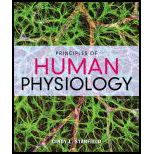
Concept explainers
Introduction:
Chemical synapses are specific junctions of the nervous system, non-neuronal cells like muscles or glands. Across these junctions, the cells pass signals to each other. A chemical synapse occurs between a motor neuron and a muscle cell. It is known as a neuromuscular junction. The nerve impulse passes the chemicals by the aid of neurotransmitters.
Answer to Problem 1E
Correct answer:
The correct answer is the option (a) Be an EPSP.
Explanation of Solution
Explanation/justification for the correct answer:
The correct option (a) Be an EPSP. EPSP is also known as an excitatory postsynaptic potential. It can be defined as a postsynaptic potential which forms the postsynaptic neuron more possibly to excite an action potential. It can also result from a drop in the outgoing positive charges and an increase in the outgoing negative charges. The
Explanation for incorrect answer:
Option (b) Be an IPSP. IPSP is also known as an inhibitory postsynaptic potential. It can be defined as a type of synaptic potential which forms a postsynaptic neuron possibly less to produce an action potential. Hence, option (b) is incorrect.
Option (c) Be stabilization of the membrane. Membrane stabilization is a process by which the local anesthetics function. They block the action potentials propagation through the nerve cells. Thus, it produces a nerve block. Hence, the option (c) is incorrect.
Option (d) Not occur. As an EPSP takes place in this situation. This option is not correct. Hence, option (d) is incorrect.
Want to see more full solutions like this?
Chapter 8 Solutions
Principles of Human Physiology (6th Edition)
 Human Anatomy & Physiology (11th Edition)BiologyISBN:9780134580999Author:Elaine N. Marieb, Katja N. HoehnPublisher:PEARSON
Human Anatomy & Physiology (11th Edition)BiologyISBN:9780134580999Author:Elaine N. Marieb, Katja N. HoehnPublisher:PEARSON Biology 2eBiologyISBN:9781947172517Author:Matthew Douglas, Jung Choi, Mary Ann ClarkPublisher:OpenStax
Biology 2eBiologyISBN:9781947172517Author:Matthew Douglas, Jung Choi, Mary Ann ClarkPublisher:OpenStax Anatomy & PhysiologyBiologyISBN:9781259398629Author:McKinley, Michael P., O'loughlin, Valerie Dean, Bidle, Theresa StouterPublisher:Mcgraw Hill Education,
Anatomy & PhysiologyBiologyISBN:9781259398629Author:McKinley, Michael P., O'loughlin, Valerie Dean, Bidle, Theresa StouterPublisher:Mcgraw Hill Education, Molecular Biology of the Cell (Sixth Edition)BiologyISBN:9780815344322Author:Bruce Alberts, Alexander D. Johnson, Julian Lewis, David Morgan, Martin Raff, Keith Roberts, Peter WalterPublisher:W. W. Norton & Company
Molecular Biology of the Cell (Sixth Edition)BiologyISBN:9780815344322Author:Bruce Alberts, Alexander D. Johnson, Julian Lewis, David Morgan, Martin Raff, Keith Roberts, Peter WalterPublisher:W. W. Norton & Company Laboratory Manual For Human Anatomy & PhysiologyBiologyISBN:9781260159363Author:Martin, Terry R., Prentice-craver, CynthiaPublisher:McGraw-Hill Publishing Co.
Laboratory Manual For Human Anatomy & PhysiologyBiologyISBN:9781260159363Author:Martin, Terry R., Prentice-craver, CynthiaPublisher:McGraw-Hill Publishing Co. Inquiry Into Life (16th Edition)BiologyISBN:9781260231700Author:Sylvia S. Mader, Michael WindelspechtPublisher:McGraw Hill Education
Inquiry Into Life (16th Edition)BiologyISBN:9781260231700Author:Sylvia S. Mader, Michael WindelspechtPublisher:McGraw Hill Education





